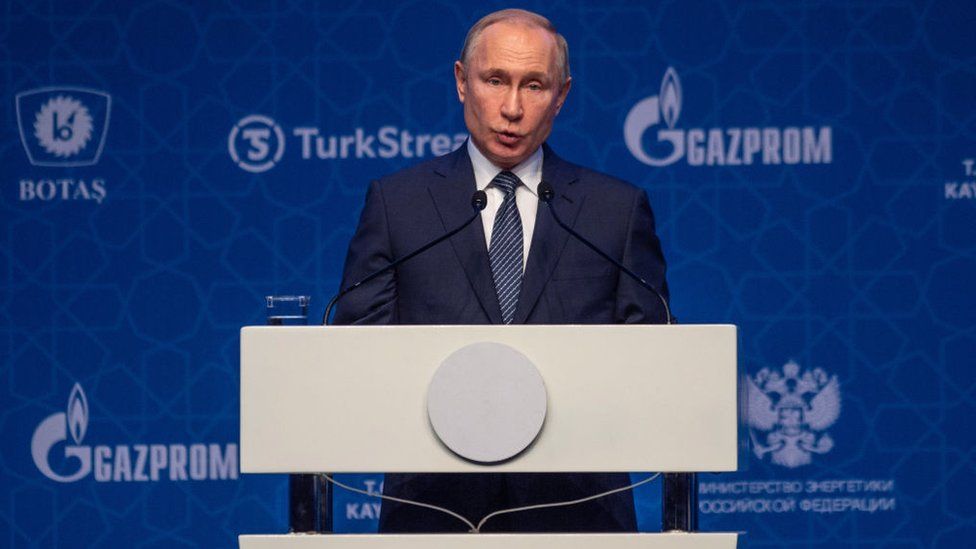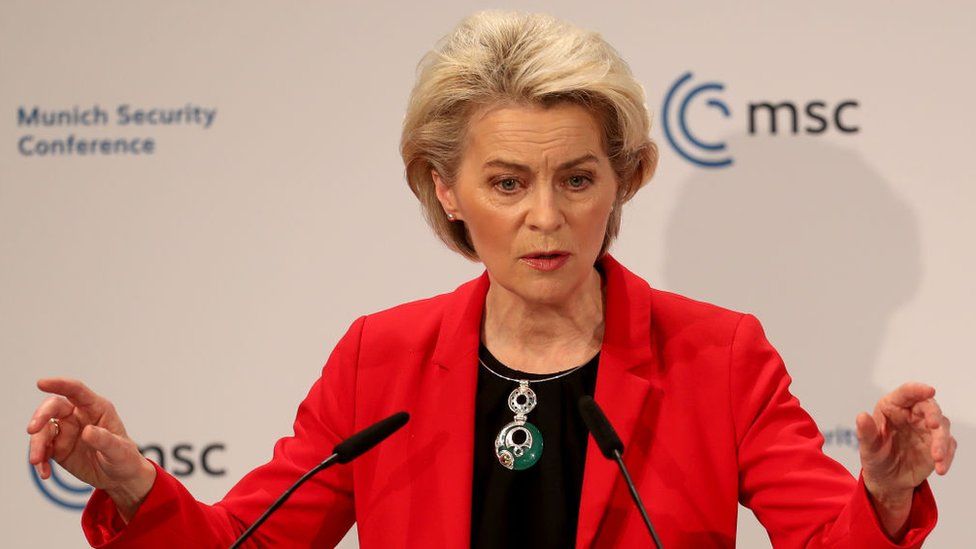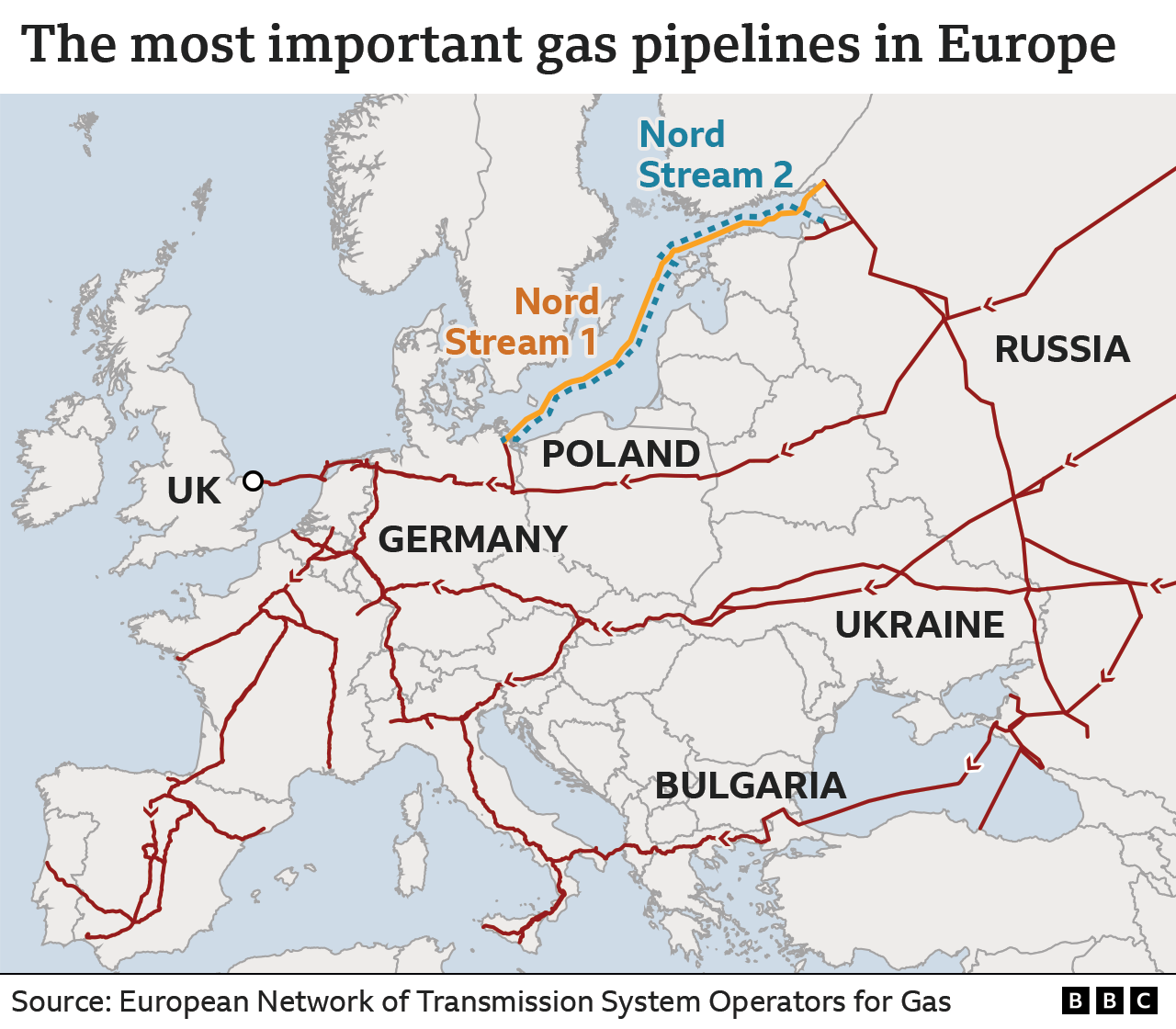
European Commission President Ursula von der Leyen has said the “era of Russian fossil fuel in Europe” is coming to an end.
Her comments come after the Russian energy giant Gazprom said it had cut off gas exports to Poland and Bulgaria.
Speaking in Brussels, Ms von der Leyen said the move showed Russia’s “unreliability” as an energy supplier.
Political leaders in Warsaw and Sofia said Moscow’s move amounted to “blackmail”.
Kremlin spokesperson Dmitry Peskov insisted that Moscow remains a reliable energy partner and claimed Russia had been forced into the action as a result of “unfriendly steps” taken against it by Western nations.
But Poland’s deputy foreign minister, Marcin Przydacz, told the BBC that Russia was seeking to “foster divisions” between Western allies.
Gazprom’s cut-off follows Poland and Bulgaria’s refusal to pay for gas in roubles.
Last month, Russian President Vladimir Putin decreed that all energy payments must be made in the Russian currency.
The move, which was designed to shore up the faltering currency which has been battered by Western sanctions, has been fiercely resisted by European nations.
In a statement issued on Wednesday, Gazprom said it had “completely suspended gas supplies” to Poland and Bulgaria in line with the decree issued by Mr Putin.
The company also warned the countries – which are transit states for Russian gas – that any unauthorised withdrawal of gas intended for other European nations would see supplies reduced by an equivalent amount.
Polish state gas company PGNiG confirmed that Gazprom’s supplies to the country had been halted and warned that it reserved “the right to seek compensation” and would use “all available contractual and legal means to do so”.
Polish President Andrzej Duda said “appropriate legal steps” will be taken against Gazprom.
PGNiG bought 53% of its gas imports from Gazprom in the first quarter of this year, but Warsaw has said it can get gas from other sources.
Gazprom says Poland and Bulgaria are being targeted because they have refused to pay for its gas in Russian roubles.
But Poland’s Prime Minister Mateusz Morawiecki says cutting gas supplies is retaliation for Tuesday’s announcement of Polish sanctions on 50 Russian individuals and companies, including Gazprom.
Polish consumers will still have gas from their stoves this morning, but the supply cut is a significant challenge for the remainder of the year.
In the first quarter of 2022, PGNiG bought 53% of its gas imports from Gazprom, down from 61% in the whole of last year. That’s a lot of gas to replace in one go.
Yes, the Polish government has successfully reduced its dependence on Gazprom in recent years, by building a liquefied natural gas terminal in Swinoujscie – where it receives tankers from Qatar.
And pipeline capacity with neighbouring EU countries is increasing. Forward thinking means Poland’s gas storage is about three quarters full and consumer demand is lower over spring and summer.
But the fact remains, Poland still needs to secure alternative supplies for the rest of the year in an already tight global market.
By the end of the year, a new pipeline that will allow Poland to directly import gas from Norway – replacing Russian deliveries – will be fully operational.

Bulgarian Prime Minister Kiril Petkov said the country was reviewing all of its contracts with Gazprom, including for transit of Russian gas to Serbia and Hungary, emphasising that “one-sided blackmail was not acceptable”.
And the country’s Energy Minister Alexander Nikolov accused Russia of using gas as a “political and economic weapon in the current war”.
Sofia, which relies on Gazprom for more than 90% of its gas supply, said overnight it had taken steps to find alternative sources but no restrictions on gas consumption were currently required for Bulgarians.
Ms von der Leyen said Gazprom’s move was “unjustified and unacceptable,” but emphasised that the bloc was “prepared for this scenario”.

The EU leader also hit out against reports carried by the media outlet Bloomberg which alleged 10 European energy companies are preparing to make payments for Gazprom gas in roubles, and that four energy companies have done so already.
She said such moves would be “high risk” for the corporations and would constitute “a breach of our sanctions”.
“Our guidance here is very clear,” Ms von Der Leyen said.
While the EU has been firm that it will not comply with Mr Putin’s demands that payments be made in roubles, some European nations, including Slovakia and Hungary have reached workaround deals with Gazprom.
The countries will pay into a euro-denominated account with Gazprombank, a subsidiary of the energy giant, which in turn will deposit the amount in roubles.
Mr Peskov refused to say how many other countries have agreed to make payments in this way.

UK Deputy Prime Minister Dominic Raab told the British broadcaster Sky News the decision to cut off gas supplies would have “a very damaging effect on Russia”.
He added it would further isolate Russia and lead to it becoming “an economic pariah”.
Ahead of Gazprom’s announcement, Ukrainian President Volodymyr Zelensky’s chief of staff accused Russia of “beginning the gas blackmail of Europe”.
Andriy Yermak said that Moscow was seeking to use energy resources as a “weapon” and called on the EU to “impose an embargo on energy resources, depriving the Russians of their energy weapons”.
Meanwhile, Vyacheslav Volodin, speaker of the Duma – the lower house of Russia’s parliament – praised Gazprom’s move and urged it to take similar action against other “unfriendly” countries.
Warsaw said it had “taken some decisions many years ago to prepare for such a situation” and PGNiG said its underground gas storage was almost 80% full and, with summer approaching, demand was lower.
Europe depends on Russia for more than a third of its gas needs and Gazprom holds a monopoly on pipeline supplies in Russia.
Energy bill help for all is too expensive, warns the World Bank
It is too expensive for governments to help everyone with their soaring energy bills, the World Bank has warned. The bank's president said Covid support schemes had not been targeted enough towards the most vulnerable and the debt will take decades to pay off. David...
Syria cancels Lebanon maritime border delegation’s visit
A planned visit by a Lebanese delegation to Damascus this week was on Monday cancelled by Syria's government, Reuters has reported. The meeting had been set up to discuss delineating the two countries shared maritime border. But on Monday the Syrian government sent...
Israel, Lebanon and Egypt edge closer to new offshore gas projects in Mediterranean
Israel on Tuesday gave London-listed Energean permission to begin producing gas from Karish, an offshore field at the heart of a maritime border agreement about to be signed with Lebanon. A statement from the energy ministry said they “gave Energean the approval to...
Motorcycle crash in Lake County kills 33-year-old man
A 33-year-old motorcyclist was killed Monday when he was involved in a crash on an exit ramp from Ohio 2, police say. Few details were released on the crash, which was reported at about 4:37 p.m. on the eastbound exit ramp to Vine Street. The rider was pronounced...
Russian recruits put into action in Ukraine with little training, poorly equipped
The mobilized reservists that Russian President Vladimir Putin visited last week at a firing range southeast of Moscow looked picture-perfect. Kremlin video of the young men headed for the war in Ukraine showed them in mint-condition uniforms, equipped with all the...
Former Ohio physician who also worked at Antioch College accused of sexually assaulting 15 patients
A former physician in southwest Ohio who once worked at a nearby college is facing multiple criminal charges after authorities say he sexually assaulted 15 female patients over several years. Donald Gronbeck, 42, of Bath Township near Xenia, was indicted on 50 counts,...
Submit your event
We will be happy to share your events. Please email us the details and pictures at publish@profilenewsohio.com
Address
P.O. Box: 311001 Independance, Ohio, 44131
Call Us
+1 (216) 269 3272
Email Us
Publish@profilenewsohio.com

